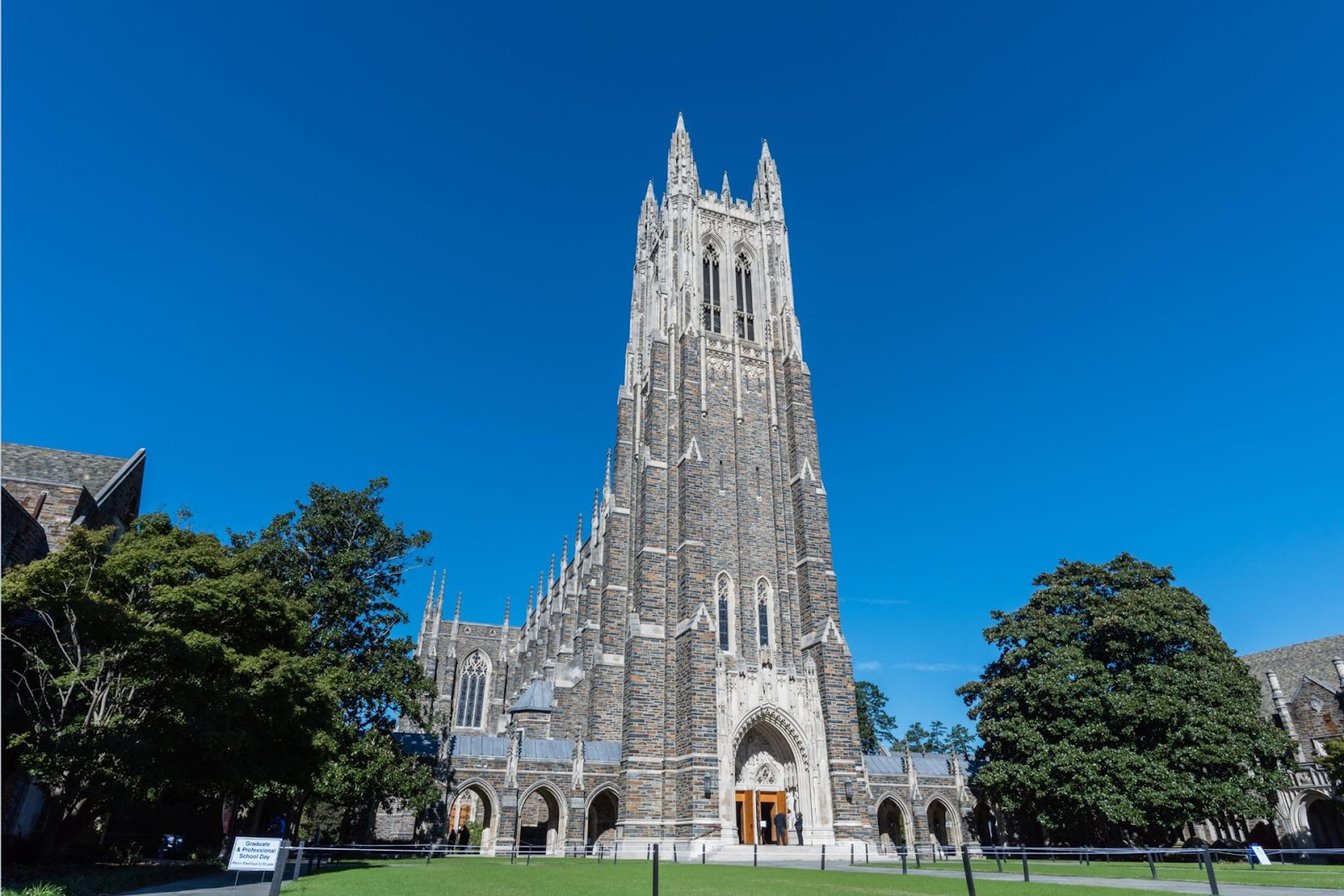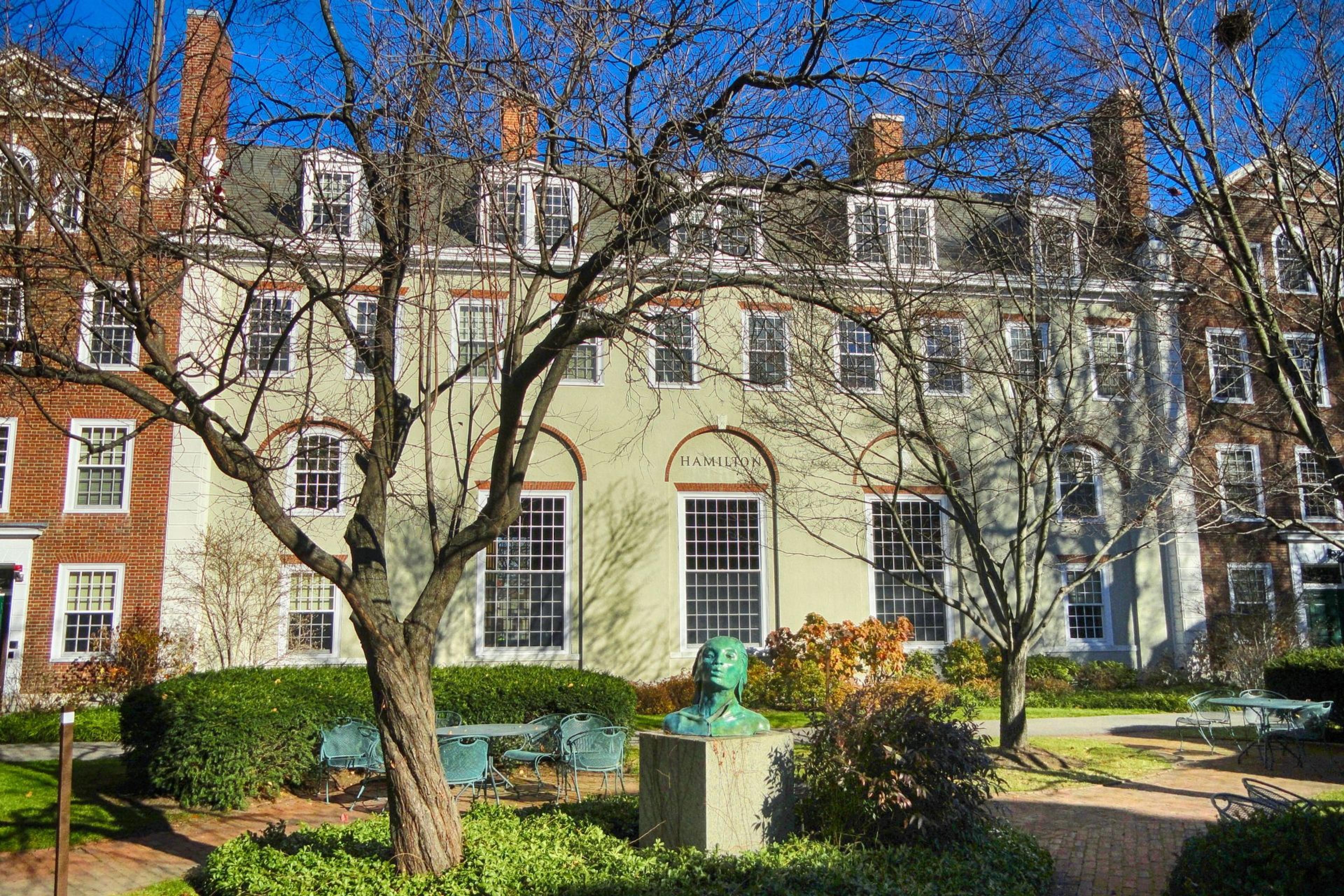
Join a free event
Learn from top coaches and industry experts in live, interactive sessions you can join for free.
Table of Contents
If you're wondering how to get into Duke University, you're not alone. Each year, tens of thousands of applicants from around the world compete for a spot at one of the most prestigious private institutions in the nation. This guide covers everything you need to know about Duke’s admissions process, academic programs, tuition and fees, financial aid options, and more — all designed to help you become one of the admitted students at this top-tier school.
About Duke University: History, Reputation, and Campus Overview
Founded in 1838 as Trinity College, Duke University officially became "Duke" in 1924 following a generous endowment from James B. Duke. Today, Duke is a top-ranked private institution located in Durham, North Carolina, and is consistently ranked among the best national universities in the U.S.
Duke is known for its rigorous academic environment, commitment to research, and vibrant campus life. The university balances excellence in the sciences, engineering, and arts with a strong focus on community engagement and global leadership. Its location in the Research Triangle gives students access to leading research hubs in both North and South Carolina.
Whether you're interested in foreign languages, biomedical engineering, or public policy, Duke offers top-tier educational opportunities across a wide range of fields.
Duke University Acceptance Rate & Admissions Process
Duke is highly selective. The overall acceptance rate typically hovers around 5–6%, with early decision applicants seeing a slightly higher admission rate. For the most recent fall admissions cycle, Duke received over 44,000 applications and admitted just under 2,500 first year students.
Key Stats:
- Acceptance Rate: ~6%
- Early Decision Acceptance Rate: ~16%
- Applicants: 44,000+
- Students Admitted: ~2,500
- Class Size: ~1,750
What Duke Looks For
The college admissions process at Duke is holistic. That means they consider more than just test scores and grades. Here’s what matters most:
- Academic performance (rigorous coursework, GPA)
- SAT/ACT test scores (optional but encouraged)
- Personal essays
- Letters of recommendation
- Extracurriculars and leadership
- Demonstrated interest in Duke
- Socioeconomic diversity and background
Standardized Tests: Duke is currently test optional, but submitting ACT scores or SATs can help competitive candidates. Middle 50% ranges for SAT are typically 1480–1570, and for ACT, 33–35.
Application Deadlines and Required Materials
To be considered for admission, make sure you meet the following application deadlines:
- Early Decision Deadline: November 1
- Regular Decision Deadline: January 2
Required Documents:
- Common App or Coalition App
- High school transcript
- Two teacher recommendations
- SAT or ACT test scores (optional)
- Essays and short responses
- Application fees or fee waiver
Duke strongly encourages prospective students to visit campus or attend virtual events. Interviews are optional but can demonstrate interest.
Tips to Get Into Duke University
Duke University is one of the most competitive national universities in the United States. With an acceptance rate under 6% and thousands of applicants each year, standing out requires more than just good grades. Successfully gaining admission means showcasing your academic strengths, character, and alignment with Duke’s values, all while meeting important deadlines and presenting a cohesive, compelling application.
Academic Excellence and Challenging Coursework
The foundation of any strong Duke application is academic performance. Duke looks for students who have consistently challenged themselves with the most rigorous courses available at their high schools, including honors, AP, IB, or dual-enrollment classes. Students who are admitted typically have top-tier GPAs, often in the 4.0+ weighted range. But numbers alone don’t tell the whole story. Duke’s admissions team evaluates your academic journey in context, including course rigor, grade trends, and the competitiveness of your high school.
Test Scores and the Test-Optional Policy
Duke is currently test-optional, but submitting competitive SAT or ACT scores can be an asset. For the most recent cycle, the middle 50% of admitted students scored between 1510–1560 on the SAT and 34–35 on the ACT. If your test scores fall within or above this range, submitting them could strengthen your application. If not, you can rely on the other parts of your application to highlight your academic promise.
Personal Essays That Tell Your Story
Duke values students who bring unique perspectives and authentic voices. Your personal essays and short-answer responses are your chance to speak directly to the admissions team. Focus on conveying who you are, what matters to you, and how Duke fits into your goals. Avoid cliché topics and instead reflect deeply on your experiences. Essays that succeed often reveal growth, passion, and the ability to think critically about the world.
Read: 4 Tips to Elevate Your College Essay
Extracurricular Involvement and Leadership
Outside the classroom, Duke seeks students who are deeply engaged in their interests and have made meaningful contributions to their communities. This doesn’t mean you need to start a nonprofit or win national awards. Rather, Duke values consistency, depth, and leadership — whether that’s in athletics, the arts, academic competitions, research, community service, or part-time work. What matters most is how you’ve pursued your passions and impacted others along the way.
Letters of Recommendation That Provide Insight
Strong recommendations from teachers and counselors can offer valuable insights into your character, intellect, and potential. Choose recommenders who know you well and can speak to your academic abilities and personal qualities. The best letters go beyond basic praise, they offer specific examples that show how you think, collaborate, and grow.
Demonstrating Interest in Duke
Demonstrated interest matters. While not required, campus visits, virtual sessions, and optional alumni interviews are great ways to show your enthusiasm for Duke. These interactions also help you determine whether Duke is truly the right fit for you. The university wants to admit students who will thrive in its environment and contribute meaningfully to campus life.
Applying Early Decision vs. Regular Decision
Applying early decision to Duke can give you an advantage. Roughly half of each incoming class is filled with early decision applicants, and the early decision acceptance rate is significantly higher than the regular rate. However, early decision is binding, so only apply this way if Duke is your unequivocal first choice and you’re ready to commit. For students still weighing options or considering financial aid packages, regular decision offers more flexibility.
Making Your Application Cohesive
All parts of your application, from your transcript and essays to your recommendations and activities, should tell a consistent story. Who are you as a learner, leader, and person? How have you shaped your community, and how will you contribute to Duke’s? Admissions officers read holistically, meaning they assess how your achievements, background, and potential come together to form a complete picture.
Early Decision at Duke
Choosing early decision is a binding agreement. It’s ideal for students who are 100% sure that Duke is their top choice. Roughly half of each class is filled with early decision applicants, making it a strategic choice for those with competitive applications.
Undergraduate Programs at Duke University
Duke offers over 50 programs across its two undergraduate schools: Trinity College of Arts & Sciences and the Pratt School of Engineering.
Popular Majors:
- Biomedical Engineering
- Electrical and Computer Engineering
- Public Policy
- Economics
- Mathematics
- Political Science
- Psychology
- English
- Computer Science
- Global Health
Both Trinity and the Pratt School of Engineering emphasize interdisciplinary learning and hands-on research. Students can double major, pursue certificates, or design custom majors that match their interests.
Tuition, Cost of Attendance, and Fees
Duke's annual tuition for the 2024–2025 academic year is approximately $66,000, with additional fees, housing, and meal plans bringing the total cost of attendance to about $85,000 per year.
Estimated Breakdown:
- Tuition: $66,000
- Fees: $3,000
- Housing and Meals: $16,000
- Books and Personal Expenses: $2,000
Duke understands that these expenses can be daunting, which is why they offers generous financial aid programs.
Financial Aid at Duke: Grants, Scholarships & Need-Based Aid
Duke is committed to meeting 100% of the demonstrated need for all admitted students, including eligible noncitizens. They offer a combination of need-based financial aid, tuition grants, and work-study to reduce the financial burden.
Types of Aid Available:
- Need-Based Financial Aid
- Full Tuition Grants for students from low-income families
- Merit-Based Scholarships (limited availability)
- Work-Study Programs
- Federal and State Aid (for eligible U.S. students)
Key Financial Aid Policies:
- No-loan policy for families earning under $40,000
- Sliding scale of aid for middle-income families
- FAFSA and CSS Profile are required
In recent years, over 50% of Duke students received some form of aid, and many qualified for full tuition grants. Your family income will directly impact the level of need-based aid or merit-based scholarships you may be offered.
Campus Life, Housing, and Student Experience
Duke’s campus in Durham is a mix of Gothic architecture, modern facilities, and rich green spaces. With over 400 student organizations, D1 athletics, and a thriving arts scene, there's something for everyone.
Students live on campus for the first three years, with access to themed housing, research-focused dorms, and cultural communities.
Key Facilities:
- Duke Chapel
- Nasher Museum of Art
- Wilson Gym and Fitness Center
- Innovation Co-Labs
- Duke Forest and Duke Gardens
Students also benefit from an inclusive community with an emphasis on socioeconomic diversity, service learning, and cultural engagement.
Career Services, Internships, and Alumni Network
Duke’s career development resources are some of the best in the country. From day one, students can work with career counselors to explore fields, attend resume workshops, and land top internships.
Career Highlights:
- On-campus recruiting from Fortune 500 companies
- Global internship opportunities
- Alumni mentorship programs
- Pre-professional advising for law, medicine, and business
Duke’s alumni network is over 180,000 strong, providing mentorship, internship leads, and job opportunities long after graduation.
The Bottom Line
Getting into Duke University is no small feat, but for driven students, it’s a challenge worth taking. With a selective acceptance rate and a holistic admissions process, Duke looks for applicants who pair academic excellence with character, leadership, and a clear sense of purpose. By focusing on strong grades, compelling essays, meaningful activities, and authentic interest in the university, you can create an application that stands out. With the right preparation and support, if needed, you’ll be one step closer to joining a community that shapes future leaders, innovators, and changemakers.
How Working with a Top College Admissions Coach Can Help
Top college admissions coaches can be invaluable for students aiming to get into elite schools like Duke University. They help applicants craft compelling personal narratives, refine their essays, choose the right academic and extracurricular strategy, and navigate complex timelines like early decisions. With insider insight into what top-tier schools look for, a seasoned coach can significantly improve your chances of standing out in a highly competitive applicant pool.
Read next:
- How to Build the Best Extracurriculars for College
- Top 10 Colleges in the US
- 4 Tips to Elevate Your College Essay
- 5 Pro Tips for Writing Successful College Application Essays
- How to End a College Essay (With Examples)
- MIT: College Application & Program Overview
- The 10 Best College Admissions Consultants
FAQs
Is it hard getting into Duke University?
- Yes, Duke is very competitive. With an acceptance rate around 6%, only top-performing students are admitted.
What GPA do you need to get into Duke?
- Most admitted students have a GPA above 4.0 (weighted). A strong academic record with rigorous courses is key.
How do I increase my chances of getting into Duke?
- Focus on excellent grades, strong test scores (if submitted), standout essays, leadership roles, and genuine interest in Duke.
Is a 3.7 GPA good for Duke?
- A 3.7 GPA is solid, but below the average for admitted students. You’ll need exceptional essays and extracurriculars to stand out.
Does Duke require SAT or ACT scores?
- Duke is test-optional, but submitting scores in the top 25% range (SAT 1510–1560, ACT 34–35) can strengthen your application.
Browse hundreds of expert coaches
Leland coaches have helped thousands of people achieve their goals. A dedicated mentor can make all the difference.



























